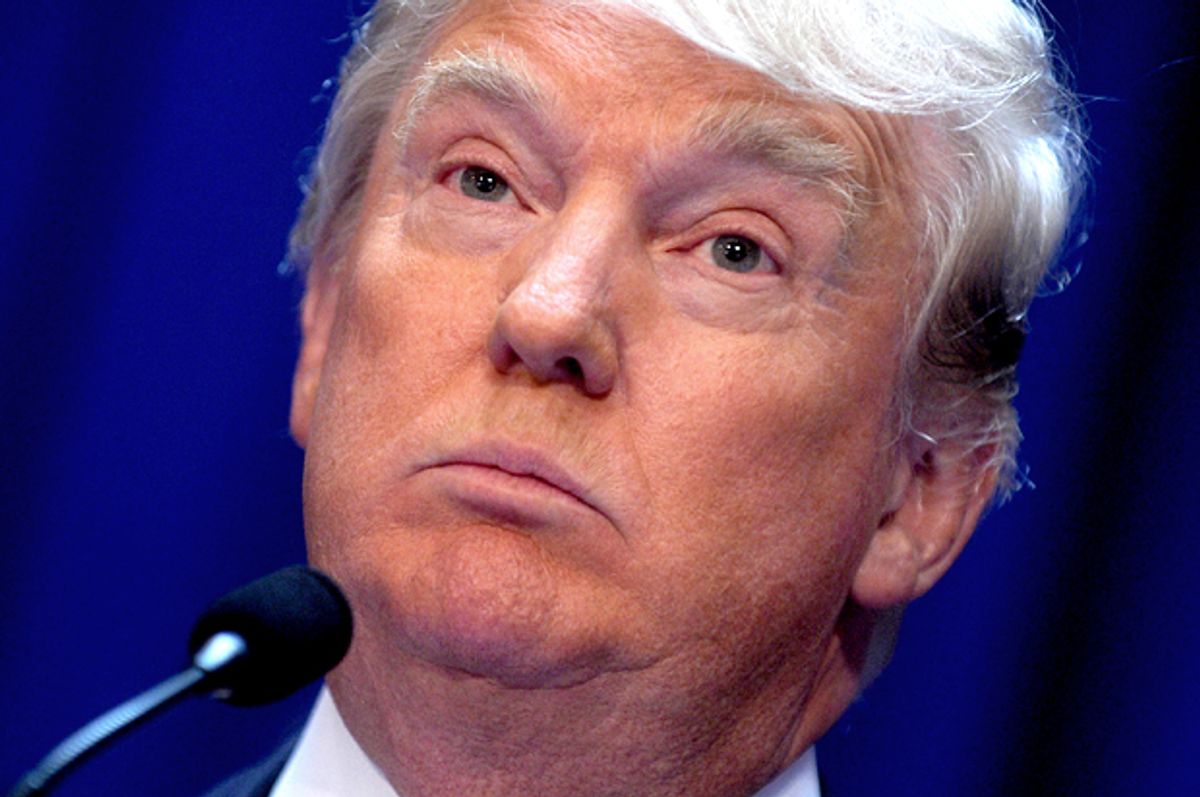It's been more than a month since Donald Trump announced his candidacy for presidency. And rather than quickly self-combust, as many expected, the Donald has actually enjoyed a cresting wave of support, taking him straight to the top of the GOP field. Not even a string of high-profile flaps seem to have any impact on the man's surging popularity.
While once thought of as a flash in the pan, Trump's candidacy has proven to be a far bigger problem for the Republican Party than establishment figures ever expected. In coping with such a colossal headache, the Party seems to be following the Kübler-Ross model of grief -- the model frequently used to describe how people come to grips with the death of a loved one.
Let's observe:
Step 1: Denial
Most institutional Republicans still appear to still be in the denial stage: "He doesn't really want to be President, he just wants to run and get lots of attention doing so." "Primary polling that show him leading the GOP field, by a good margin, is just a mirage." "His candidacy will fade like those of other novelty GOP candidates in the past, even if he started with far more name recognition and money than any of those predecessors." "He's not really worth $9 billion and maybe not even $3 billion.""As soon as yet another imagined dream candidate gets in the race he'll start eating into Trump's lead." "He -- or an staffer -- said something so offensive it will make him toxic." Curiously, this latter form of denial always seems to focus on what Trump said, not what he did.
Step 2: Anger
It's that series of things that Trump has said, starting with the claim that immigrants are rapists,, which Republicans (fairly) worry might damage the party brand, that has led them to start lashing out -- although the response was muted, as anything short of full-blown nativism risks damaging the national prospects of GOP candidates these days.
Trump's attack on John McCain's service in Vietnam earlier this month finally gave Republicans the opportunity to get mad without losing political points with the paleoconservative crowd. So, in spite of the Republican Party's own serial use of slurs against war heroes for political gain, just about every top figure in the party (save Ted Cruz) pounced on Trump's statement and declared he had gone too far. Many believed Trump's indelicacy would end his campaign.
Except -- as just a few predicted -- it didn't work out that way. Indeed, his standing in the polls actually improved, perhaps bolstered by the many base voters who aren't as fond of John McCain as the beltway media.
While Republicans may try to attack Trump on issue after issue as a way to try to damage the blustery billionaire, it's not clear that will do anything but bolster his outsider cred among voters who actually share some of the same values -- even if mainstream Republicans would like to disown the most inflammatory versions thereof.
Step 3: Bargaining
As Trump's continued strength -- and decisive pull in any third-party bid has become clear -- the focus has shifted to securing assurances that he won't withdraw his considerable fortune from the GOP and run on the Donald Trump Party ticket.
Similarly, the Republicans are slightly changing the rules of the game to boost more palatable candidates, like the also-ran Lindsey Graham (whose candidacy got its most attention ever when Trump handed out Graham's personal cell phone number earlier this month). If Trump continues to dominate in the polls, operatives will almost certainly approach Trump about maybe accepting a handler who could prepare him for the more traditional parts of campaigning -- and temper his most outrageous statements.
But because of Trump's fortune, he cannot possibly be controlled with the monetary promises of the Kochs or Sheldon Adelson. The GOP may start bargaining with Trump, but he still holds most of the cards. That means he'll probably continue to violate Reagan's 11th commandment, "Thou shalt not speak ill of any Republican," as he did in response to being called a dumb-dumb by a Scott Walker funder the other day.
Depression
All of which means that -- so long as the base continues to eat up Trump's schtick --the Republicans are going to be stuck with him, because they have few means of controlling him and even fewer to limit any damage he might do if provoked. I don't wish depression on those faced with the prospect of Donald Trump leading their party. But I understand why they might feel that way.
Acceptance
If all proceeds as things appear to be proceeding -- although, yes, it is far too early to say for certain that it will -- Republicans will ultimately be applauding the prospect of President Trump. complete with the possibility he'll appoint Dennis Rodman (drawing on his diplomatic trip to North Korea) as Ambassador to China. If and when Trump becomes the only viable opponent for Hillary Clinton, Republicans will be forced to accept their fate and hope for the best.
And with it, they may well recognize that their ideological celebration of the rich and of demagoguery have delivered them precisely the candidate they've asked for.

Shares